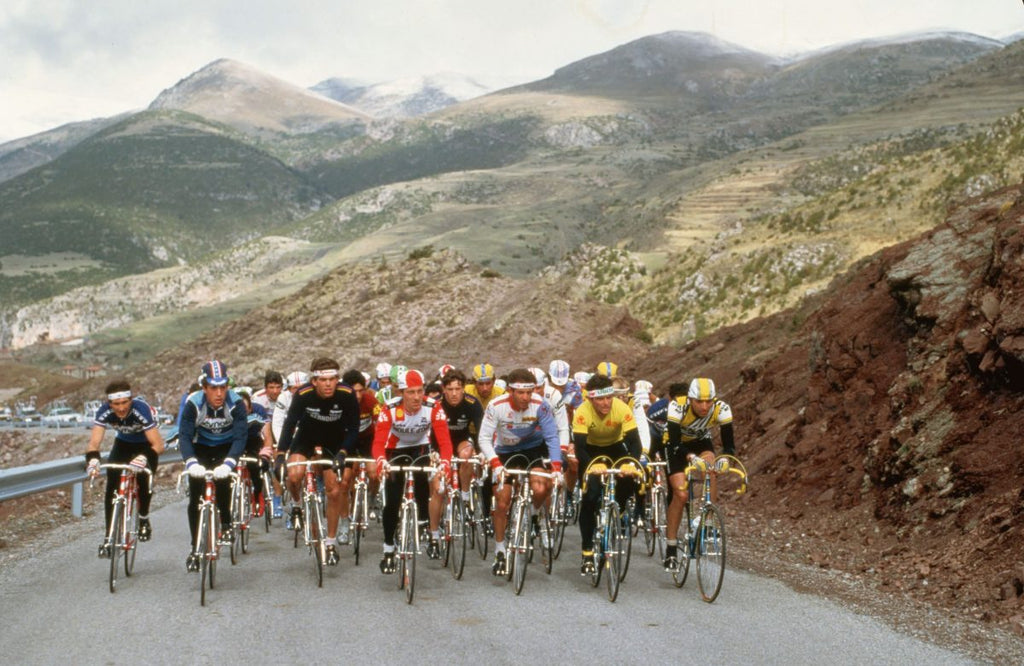Grand Tours come in three sizes: run of the mill, spectacular, and epochal – those which define an entire era and which dictate cycling’s pattern for years to come. The 1983 Vuelta falls into the third category.
It could be summed up as “Bernard Hinault versus the Spanish Armada” – the great Frenchman pitted against the golden generation of Spanish cyclists which included Marino Lejarreta, Julian Gorospe, Pedro Delgado, Alvaro Pino, Eduardo Chozas, Alberto Fernandez and Vicente Belda.
The “Armada” was a loose coalition of senior Spanish professionals who would combine to ensure victory for one of their own, as Robert Millar was to find to his cost a couple of years later.

The coalition’s emergence coincided with Spanish resurgence after the Franco years, live television coverage of their home Tour and began a golden period which culminated in Miguel Indurain’s five Tour wins in the early 1990s. Of the “Armada”, it was Delgado, who finished 15th in that year’s Vuelta, who would go on to make the biggest mark on cycling.
This was the hardest fought of Hinault’s nine Grand Tour wins; one by one the “Armada’s” various members raised their heads, pitted their strength against the Breton, and were crushed.

Lejarreta was first, then Fernandez, finally, and most painfully, Gorospe, who still believed years later that had the Reynolds team hit Hinault hard on one day in particular, stage 14 to Leon, they could have eliminated him once and for all.
Instead, Hinault came good on the final mountain stage from Salamanca to Avila, when Laurent Fignon showed his potential in helping his leader dislodge Gorospe on the Puerto de Serranillos.

After an epic 80-kilometre escape, with Lejarreta and Belda barely hanging on, Hinault had turned Gorospe’s slender 10 second lead into a 20 minute deficit.
For Hinault and his Renault team, this was a turning point. The four-times Tour winner had been nursing tendinitis in his right knee for much of the race. His knees had been something of a weakness since his early years as a cyclist, and he had famously been forced to pull out of the 1980 Tour when wearing the yellow jersey due to an injury.
At the Vuelta, the cause was unclear – changes to his saddle position were rumoured, and the horrendous weather due to the Spanish Tour’s spring date probably contributed as well – but the damage was far more severe than in 1980.

At the end of the race, Hinault had trouble walking and four days afterwards, he was unable to start a criterium. In July, he had an operation on the tendon, and he was never physically quite the same imposing force as he had been in his prime, even though he went on to take his fifth Tour in 1985.
His place at the Renault team was taken by Fignon, who after his help in the Vuelta landed a surprising win in that year’s Tour de France. With no certainty that Hinault would recover, team manager Cyrille Guimard became convinced that his Breton star’s time was truly up.
That decision was vindicated, or so it seemed, when his other protege, Greg LeMond – who started that Vuelta but abandoned due to illness – won that year’s world championship.
Hinault would leave Renault to set up the La Vie Claire team. LeMond and Fignon would take over, although Lemond would later join Hinault in the new team. The interactions between the three men set up a series of battles in the Tour – often featuring Delgado in particular – which would define the Tour de France throughout the 1980s.

The epics in 1984, 1985 and 1986, as well as 1989, could all be traced back to Hinault’s decision to fight through the pain in his knee and take a Vuelta victory which clearly came at way too high a cost.
William Fotheringham is the author of The Badger, Bernard Hinault and the Fall and Rise of French Cycling, published by Yellow Jersey Press.































